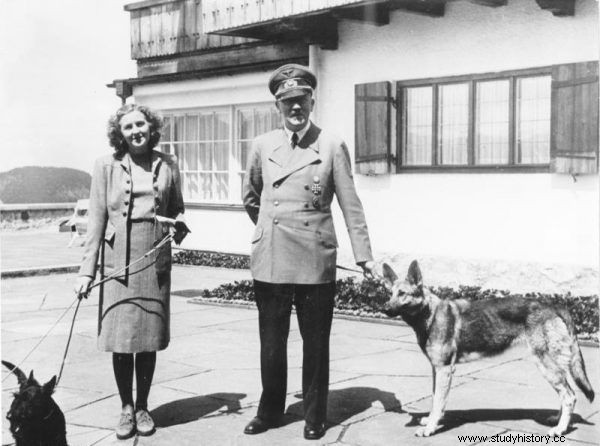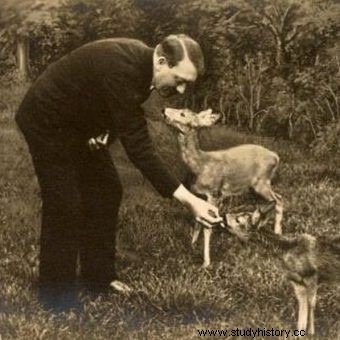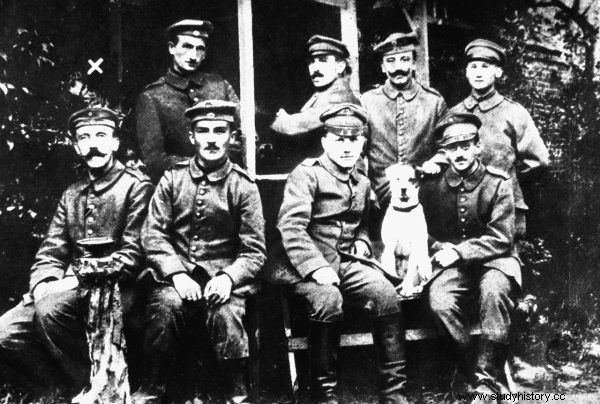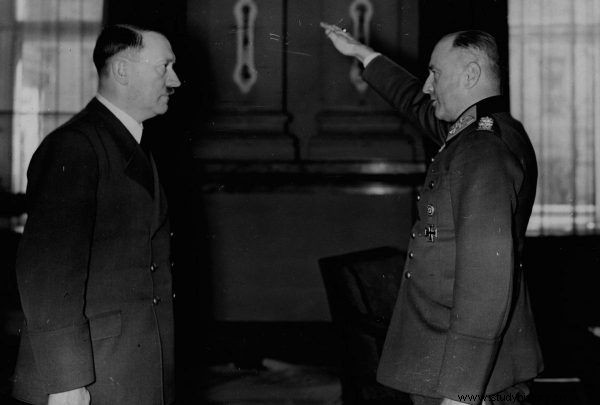Adolf Hitler did not eat meat and after conquering all of Europe he wanted to ban it in all occupied countries - this is a popular myth that is cited on various occasions, for example to discredit the idea of vegetarianism. Historical evidence, however, is indisputable. There is no doubt that Adolf Hitler ate meat for most of his life and hated both humans and animals.
The figure of Adolf Hitler, leader of the Third Reich, who conquered almost all of Europe during World War II, still fascinates humanity. His fate, from childhood to death, decisions, orders, plans and intentions were and are still being analyzed. The figure of this tyrant, murderer and perpetrator of extermination of millions of people, is still the subject of heated discussions and debates not only among historians. It is also permanently present in pop culture, including historical literature. Hitler seems to be the most described figure in human history today, even more popular than Jesus in recent years. This is evidenced by hundreds of books that have appeared in recent years.
Popkultura
Let us recall a few titles published in Poland:Adolf Hitler. Conversations at the table, Adolf Hitler. Unknown scenes from life, Hitler's turbulent youth, Chocolate cake with Hitler, Was Hitler sick ?, Hitler's House, Hitler's clairvoyant, Hitler - man and monster, Hitler and women, Hitler through the lens, Hitler. Biographical report, Hitler's lovers and friends, Hitler's Myth, They controlled Hitler, Hitler's last day, Hitler's first war, Hitler's private library, Hitler's religion, I was with Hitler until the end of 1940-1945 ...

Eva Braun and Adolf Hitler with their dogs
That's not all, in bookstores and second-hand bookstores, we can also find many items written by people who were in direct contact with the fuhrer during the war. They include:I was Hitler's secretary, I was Hitler's butler, I was Hitler's driver, or I was Hitler's adjutant. Jokingly speaking, this series probably lacks "I was Hitler's plumber" and "I was Hitler's chimney sweep" . However, even they would not exhaust the topic, because there are certainly many aspects still not noticed and fully described.
The authors of history books also studied the fate of Adolf Hitler's family several generations before his birth, and others dealt with his fate after his death - for example in sensational, science fiction publications such as "Hitler in Argentina".
Hitler's personal life and diet were also very popular. This is due to a widespread myth that he completely rejected meat-eating out of love for animals. This information is shocking to many of us, compared to the fact that Hitler waged bloody wars against everyone, conquered neighboring countries, and carried out the planned extermination of many national and social groups, primarily Jews, but also Roma and Sinti, Slavic peoples, in including Poles, Belarusians and Russians, as well as homosexuals, people with disabilities, mentally handicapped and many others. This leads to the proposition that Hitler murdered millions of people, but at the same time cared for the lives of animals and that he valued them more than the lives of humans. This information is often used for indiscriminate attacks on vegetarians. They often hear derogatory words:"Hitler was a vegetarian - just like you."
Hitler's "secret" diet
Hitler's culinary tastes were very carefully screened. It is undoubted that Hitler attached great importance to culinary issues and cared for his diet, primarily for health reasons. His mother (Klara Hitler née Pölzl) died of cancer and Adolf was afraid that he would also meet it. For the same reasons, he did not smoke cigarettes and did not allow smoking in his company. Back in the 1930s, he believed that they harm the lungs and cause cancer. In his youth he suffered from indigestion and stomach pains. He tried to cure it with a proper diet, incl. by eating more vegetables and you actually improved.
In 1911, when he was still living in Vienna, he wrote in a letter:"I am glad to let you know that I already feel generally well ... it was nothing, just a slight stomach upset and I am trying to heal myself with a diet consisting of fruit. and vegetables ". He quickly discovered that reducing the amount of meat he consumed made him sweat less and feel better. He also believed that eating vegetables reduced gas, which was one of his many obsessions.

It is believed that one of the reasons Hitler restricted meat-eating was his love of animals
Hitler's life researcher, Ian Kershaw, claims that the Führer stopped consuming animal protein after the suicide of his niece Gela Raubal in 1931. After this event, Hitler experienced a breakdown and announced suicide. Was it the fulfillment of Gela's promise to quit eating meat, or a form of punishment for this death? Such a thesis was put forward by the famous psychoanalyst Erich Fromm.
Kershaw also gives another reason for Hitler's decision. Even then, he suffered from chronic stomach pains, which turned into acute attacks in times of stress. The medicine he was taking - an oil-based trench cleaner for gun cleaning - was poisoning him, causing headaches, double vision, imbalance, and ringing in his ears. So he decided to change his diet because he knew from experience that good results can be achieved in this way. But it was certainly not during this time that Hitler had completely eliminated meat from his diet.
Dione Lucas, before the war, worked as a chef in a Hamburg hotel. She remembers being called upon to prepare Hitler's favorite dishes. They were mostly stuffed, freshly feathered, about 4 weeks old. In her opinion, it was Hitler's favorite dish, and certainly the most frequently ordered by him in a hotel where he often stayed.
When he reached the top, became leader of the NSDAP, and later chancellor, he finally had the conditions to eat whatever he wanted. Initially, the chef Willy Kannenberg was hired for him to prepare traditional German dishes, including meatless dishes. Later, at Hitler's request, a dietary cook was hired to prepare properly composed dishes in accordance with his earlier, strict instructions. A group of 15 women was also employed at the Headquarters, whose task was to try the dishes before the Führer eats them. This was to prevent poisoning him.
Probably only during the war, from 1942, Hitler began to follow the stricter rules of the vegetarian diet, but still did not completely abandon meat. But then he started to consider himself a vegetarian and call himself that. In July 1943, Helena Maria von Exner became the dietitian of the leader of the Third Reich, who was released in May 1944 when it was discovered that she was of Jewish origin. Since then, her duties have been taken over by Constanze Manziarly, a native of Tyrol, who - due to her complicated surname - was called "Mrs. Marcepan" in the Headquarters.
During her service in the Wolf's Lair, Helena Maria von Exner introduced vegetarian soups (without meat stock) to Hitler's diet, but continued to cook his beloved Viennese stew - certainly meat . Exner had reservations about the vegetarian diet and was not following it.
On the other hand, the letters "Mrs. Marzipan", discovered by the Austrian historian Stefan Dietrich, show that Hitler did not eat meat in the last years of the war, and his favorite dish was millet with cottage cheese covered with linseed oil . He usually ate two apples for dessert. He also liked finely chopped mushrooms and cakes, which had to be made according to special recipes.
At the end of the war, one of the soldiers of the commander's bodyguard, serving in the Führer armored train called Amerika, "caught" Hitler eating ham. It was also common knowledge that Hitler loved caviar but did not eat fish. He also loved the traditional Austrian dish Leberknödl (liver dumplings) and the baked and stuffed venison. Leberknödl appeared on the Führer's table almost for the rest of his life.
Vegetarian or not?
It is assumed that vegetarianism is not only a diet, but also a philosophy of life that excludes meat, fish and seafood from the diet. It may result from moral, health, environmental or economic reasons. Vegetarians who do not eat meat ethically believe that animals suffer and should be treated better. They are opposed to the killing of animals on farms, especially the industrial production of meat.
A more radical form of vegetarianism is veganism, which is currently fashionable, which implies not eating any animal products such as eggs, milk, butter and cheese, and even honey. (This certainly did not apply to Hitler, who loved eggs so much that he ordered them for his last dish of life.)
Currently, "milder" forms of vegetarianism are also distinguished, such as, for example, semivegetarianism and its various variants, e.g. polovegetarianism (eating poultry, red meat is excluded) or ichthyovegetarianism (eating fish is allowed, eating other animals is excluded). There is also a variation of the diet called raw food, which consists in consuming only fresh products and refuses to cook or fry food. Hitler was using some elements of a raw food diet for health reasons . However, he was definitely not a vegetarian in the fullest sense of the word.
Goebbels creates an image
Hitler liked Bavarian sausages, although he did not eat much of them. He ate pasta, oatmeal, potatoes with cottage cheese. He generally did not drink alcohol, but sometimes reached for beer or watered down wine. He was also a connoisseur of sweets, candied fruit and cream cakes, which he devoured in huge amounts. He drank tea and coffee with lots of cream and sugar. He ate little and rarely. As you can see, he liked to indulge himself and it is difficult to talk about any asceticism, let alone vegetarianism. In the song "12 groszy" Kazik Staszewski poses a very accurate question:"what is this vegetarian, what a *** pork chop"? Could this passage be about Adolf?
Propaganda Minister Joseph Goebbels was responsible for promoting the image of Hitler as an ascetic leader who sacrifices everything, his whole life and health for the Third Reich. It was he who decided that the creation of an idealized image of the leader would win over the Germans even more, and even raise him to the rank of a deity who, after all, had no weaknesses and faults. From 1938, Goebbels and his propaganda apparatus portrayed Hitler as the ascetic of the non-meat-eater, non-smoker and non-alcoholic. In addition, information about Hitler's unmarriage was propagated. It was a water pic-photomntage.

Goebbels cared about the positive image of Hitler
Hitler was a bachelor, but he had many lovers, and during the war he became permanently associated with Ewa Braun, with whom he eventually married in the last hours of the battle for Berlin. The Fuhrer's abstinence was not very strict, but it was used and publicized anyway so that others would follow in his footsteps. Care was taken not to show Hitler's photographs, e.g. with a glass of wine in his hand. Everything for show only.
“His asceticism was a fiction invented by Goebbels to emphasize his total devotion, self-control and distance from ordinary people. By this external simulation of asceticism, he could claim that he was devoted to the service of his people, "wrote Ralph Meyer, author of the book on Hitler's diet.
“Hitler's asceticism was a fiction invented by Goebbels to emphasize his total devotion, self-control and distance from ordinary people. By this outward mocking of asceticism, he could claim to be devoted to the service of his nation, "wrote another historian, Robert Payne.
In turn, Rynn Berry, who studies the history of vegetarianism, stated that Hitler's vegetarianism was only a "marketing" activity invented by Nazi propaganda.
In fact, Hitler was far from ascetic, and his life was by no means dominated by the inner peace, friendship and love for people and animals that are usually associated with vegetarianism. Hitler hated everyone and everything. Even in his immediate vicinity, he had few close friends whom he respected and valued. Most people, including his beloved nation, treated them as enemies.
He liked dogs, however, and he became very attached to them. The first, whom he made friends for longer, during the fights on the fronts of World War I, was a terrier named Fuchsl. The dog got lost and crossed the enemy lines, and Hitler became his guardian. Later, when the detachment had to change position and Fuchsl could not be found, Hitler became very worried about it. “I liked him so much. He only listened to me, "he recalled.

Photo from the period of the First World War. Hitler is seated first from the left, and Fuchsl is also there.
The second dog, with which Hitler became strongly and for a long time, was Blondi, a German Shepherd female dog. Blondi went everywhere with the Fuhrer and had special privileges. She slept in his room, and elected marshals and generals could serve her delicacies. The undoubted love for Blondi did not prevent Hitler from ruthlessly using the dog. In the last hours of the fighting for Berlin, at the behest of Hitler, Blondi's guardian, veterinarian Fritz Tornow, gave her a poison pill to make sure it was actually working. Blondi died after 30 seconds.
Perhaps the love of dogs indicates that Hitler was fond of animals, and that prompted him to limit his meat consumption? Certainly not, because it is known that during his youth he carried a whip with him and used it to whip Fuchsl in a cruel way, much like his father did with his own dog. In another situation, he tortured the dog in front of a little girl to show that he had an advantage over him. According to Ian Kershaw, both with his dogs and with everyone he came into contact with, all relationship was based on domination and submission.
People like animals
The epithets he often used are a confirmation of the thesis about Hitler's hatred of both people and animals. He often called his opponents, and also his generals, "pigs" and "lousy dogs." The Bolsheviks were "animals", the Russians "beasts", the Slavs "the rabbit family" . After the occupation of Russia, he said that he wanted "one hundred million Slavs to live in pig barns." He called British diplomats "worms". He also despised his own people, saying that they were "a big, stupid flock of rams." He even called his own sisters "stupid geese."
He believed that nature was governed by the law of struggle. He wanted young Germans to be brutal, commanding, fearless and cruel ("The youth who will grow up in my fortresses will intimidate the world"). They were not allowed to show weakness and meekness. ("The gaze of the free, predatory animal must radiate from their eyes again. I want my youth to be strong and beautiful.")
Once, he summed up his view of the world with one sentence: "He who has no strength loses the right to life" . Compassion and gentleness were hated by Hitler, who believed that only strength was law and that only the strong deserved to inherit the land. He completely despised the vegetarian philosophy of non-violence and mocked Mahatma Gandhi's peaceful path.

Hitler demanded full obedience, this applied to both humans and animals. In the photo, General von Brauchitsch is greeting the leader of the Third Reich.
At the same time, Albert Speer, the main architect of the Third Reich, mentioned that Hitler sometimes presented gruesome descriptions of slaughtering animals while eating in order to encourage his fellow diners not to eat meat. He was also against animal abuse and vivisection, and announced that such experiments would be banned. In turn, Goebbels claimed that Hitler announced that he would take up the issue of introducing universal vegetarianism after the victorious war, because "now there are no conditions for it." During Hitler's reign in the Third Reich, many animal welfare laws were introduced that prohibited the harassment and mistreatment of animals. At the same time, millions of people were murdered on a massive scale in the camps.
In 2017, French scientists received permission from the Federal Security Service of Russia to examine the remains found in the gardens of the Reich chancellery. When examining part of Hitler's jaw, no traces of animal fiber were found on it. Is this evidence that he did not actually eat meat? The answer is ambiguous, because in the last months of his life, Hitler ate little at all, and was kept alive by the strong drugs and stimulants with which the doctor stuffed him. Perhaps in the final months of the war, Hitler did indeed quit meat entirely. As late as 1944, he ate them sporadically.
It seems that the discussion of Hitler's diet and whether he was a vegetarian or not may flare up again, because at the end of last year, the Italian writer's novel "At the table with Hitler." It is an international bestseller, partly based on facts, telling the story of twenty-six-year-old Rosa Sauer, who became a tester of Hitler's dishes. Three times a day, she and nine other women go to Hitler's headquarters in the Wolf's Lair to taste his dishes before he eats them. Do Hitler's testers eat vegetarian or meat dishes? You have to check it yourself…
